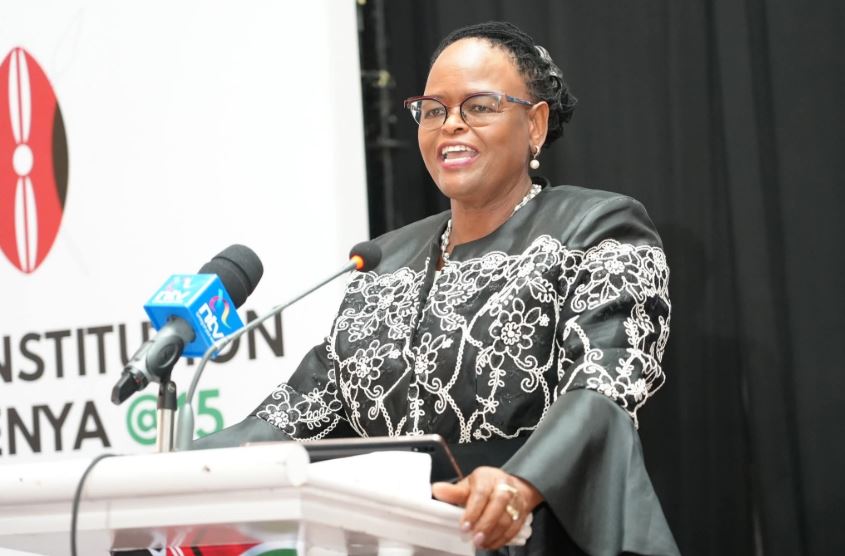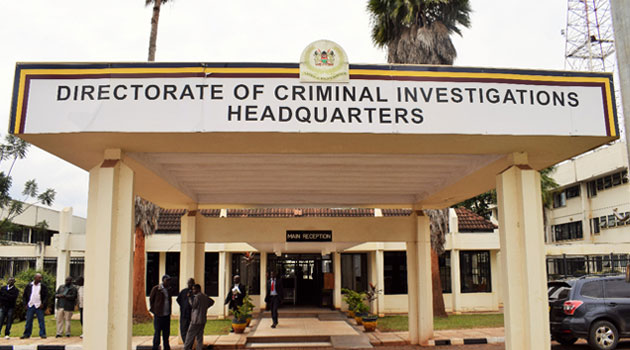Four judges removed, 210 staff sacked for misconduct since promulgation of 2010 Constitution - CJ Koome

Koome revealed that the Judicial Service Commission (JSC) has handled 946 petitions against judges, with 95 complaints still pending.
At least four judges have been removed from office since the promulgation of the 2010 Constitution, while 210 judicial staff have been dismissed for misconduct, Chief Justice Martha Koome has revealed.
Speaking on Wednesday during Katiba Day celebrations to mark 15 years since the Constitution’s enactment, Koome revealed that the Judicial Service Commission (JSC) has handled 946 petitions against judges, with 95 complaints still pending.
More To Read
- Men dominate Judiciary complaints and case filings as gender gaps persist despite digital progress
- Judiciary reports 17 per cent drop in fines collected for minor offences in 2023/24
- CJ Koome warns new advocates against misappropriating clients’ compensation
- Judiciary holds historic 'closing of files' ceremony to honour fallen judicial officers
- LSK demands probe into alleged judicial misconduct at Maua Law Courts, accuses magistrates of shielding officers
- Karua accuses section of MPs of manipulating public participation in lawmaking process
“To date, the commission has processed a total of 946 petitions against judges, reflecting the seriousness with which it treats public grievances and the commitment to upholding integrity in the administration of justice. Four judges have been removed from office over this period. At present, only 95 complaints remain pending, most of which are at various stages of inquiry, demonstrating both the efficiency and transparency of the Commission's processes,” she said.
Additionally, she disclosed that 210 judicial staff had been dismissed after due process confirmed misconduct.
“This is also a clear signal that any collapses within the institution will not be tolerated. These figures illustrate not only the robustness of internal accountability mechanisms, but also the determination of the Judicial Service Commission to maintain the highest standards of professionalism and public trust,” she said.
She highlighted significant achievements in expanding judicial infrastructure, noting that magistrates’ courts had grown from 111 to 143, with the target being to establish courts in all 290 constituencies.
“The Court of Appeal, which used to have a permanent bench in Nairobi, now has permanent benches in Kisumu, Nyeri, Nakuru and Mombasa, making justice more accessible,” she said.
Koome further pointed to specialised courts, including the Environment and Land Court, which has enhanced the resolution of land and labour disputes. She said the establishment of 40 Small Claims Courts has enabled the resolution of disputes worth less than Sh1 million within 60 days. Gender Justice Courts and children’s courts have also been set up to ensure survivor-centred and child-friendly handling of cases.
Reflecting on the transformation journey since 2010, the CJ said reforms have been guided through three phases: the Judiciary Transformation Framework (2012–2016), Sustaining Judiciary Transformation (2017–2021), and the current Social Transformation through Access to Justice, which emphasises technology and people-centred service delivery.
“We champion a very bold shift in reforms, towards people-centred justice, towards a multi-door approach to the delivery of justice, towards leveraging on technology and innovation in the dispensation of justice, and ensuring that we widen the door of justice for the vulnerable and the marginalised who have historically been excluded from access to justice,” Koome said.
Despite the milestones, Koome raised concerns that the Judiciary continues to grapple with challenges, including intimidation, cyberbullying, disinformation and inadequate funding.
“Despite the Judiciary’s vast mandate, presence of courts throughout the country and over 8,000 members of staff, the judiciary receives less than one per cent of the national budget, far below the recommended three per cent,” Koome lamented.
She, however, praised the strengthening of judicial independence as one of the greatest gains of the Constitution, citing landmark rulings on presidential election petitions, the Building Bridges Initiative (BBI), LGBTQ rights, inheritance rights for children born out of wedlock and the Senate’s oversight powers over governors.
“In 2022, the Supreme Court affirmed that the Senate is constitutionally empowered to summon governors to appear before it or its committees to answer questions and provide information regarding county finances. The court further clarified that both the Senate and county assemblies possess oversight authority over county revenue, whether derived from national allocations or locally generated resources,” she said.
Koome reaffirmed that the Judiciary will remain firm in upholding the Constitution and standing against abuse of power.
“As Chief Justice, I take this opportunity to reassure Kenyans of our unwavering fidelity to the Constitution. We shall continue to administer justice without fear or favour, to check abuses of power, and to defend the rights of Kenyans where necessary,” she said.
The CJ described the 2010 Constitution as a defining moment in Kenya’s history, noting that it ushered in principles of good governance, social justice, human rights, equality and accountability.
“That moment represented not only a legal transition but a rebirth of our nation. It was a profound political and social moment, born from decades of struggle and a collective yearning for a more just, equitable, and democratic society,” Koome said.
She also emphasised that courts have entrenched the principle of public participation by striking down laws and policies that failed to meet constitutional requirements.
“The Judiciary has given life to the principle of public participation, striking down legislation where citizens were inadequately consulted,” she said.
Koome added that access to justice has been boosted through the expansion of High Court stations and registries to all counties, compared to the pre-2010 era when they were concentrated in provincial headquarters and major towns.
The Chief Justice reassured Kenyans that the Judiciary’s commitment to the Constitution remains steadfast.
“We shall continue to safeguard rights, uphold justice, and check any abuse of power without fear or favour,” she said.
Top Stories Today














































